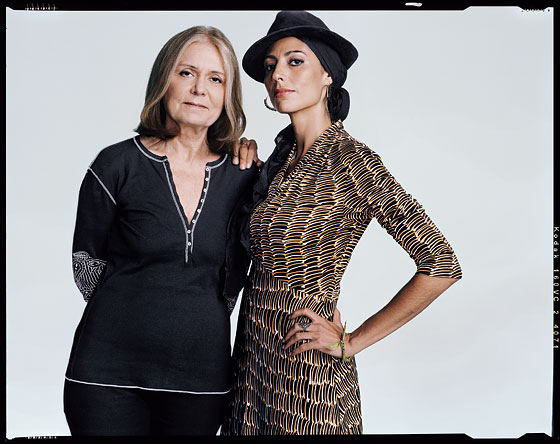 |
Gloria Steinem and Suheir Hammad
(Photo: Dan Winters) |
When Suheir Hammad arrives at Gloria Steinem’s apartment on the Upper East Side—the same one Steinem has lived in since 1968—the two embrace like old friends. Then Sarah Palin comes up. “What is going on?” yells Hammad. Steinem grins and shrugs. She’s been working all day on an op-ed. “It’s such an insult,” she says.
Hammad is 35; Steinem is 74. The child of poor Palestinian immigrants, Hammad was raised in Sunset Park, Brooklyn, then became a poet and activist (her movie Salt of This Sea premiered at Cannes). “She is the embodiment of the global reach of feminism,” says Steinem. Steinem, who grew up in Toledo, Ohio, and moved to New York City in 1960, is the most famous feminist in the world, and one of the original writers at New York Magazine.
We gathered in Steinem’s cozy, taffeta-draped living room to talk about what had changed, and what hadn’t, interrupted only when a delivery man arrived with an enormous palm tree, as if this were an oasis from the unsettling developments in the larger world.
New York: As a girl, how did you imagine life as a grown woman?
Suheir Hammad: I came from a traditional immigrant family where education meant there were only a few valid paths: doctor or lawyer, and I didn’t want to be either one.
Gloria Steinem: A sign of progress, such as it is! I was well into my thirties before I met a female doctor or lawyer. The only options I had were what was going to happen during that time between school and getting married and having children. So I was looking to show business. [Laughs] How impractical. But the only place I saw women doing something nontraditional was there. I think show business was for us what sports is for boys in poor neighborhoods. So I was taking dancing lessons and lying about my age—at 12 pretending to be 18, because I was very tall. Working for ten dollars a night, tap dancing for two shows in the Eagles Club. But marriage seemed like the end of all choice. And so I kept extending that golden period.
NY: Were there similar expectations about marriage and children for you, Suheir?
SH: When I graduated grammar school, one of the smartest girls was pregnant. She was 11. By the time she entered junior high school, a few months after the rest of us, three more girls were pregnant. I don’t know if it’s something about accents, or lack of understandable English, but you become more of a body if English isn’t the first thing people hear, you know? So I have this huge dichotomy between my traditional Muslim parents’ idea of a woman’s strength being modesty, and your body being a gift—no pearls to swine, literally. And the extreme opposite, which was the girls I grew up with, in hip-hop and on TV, wearing the tightest jeans, the big booty shorts, low cut. I grew up, like every other girl, between these two polar—what do you call them? I mean, they’re not ideals.
GS: That’s the classic virgin-whore dichotomy. When I was growing up, girls were good or bad. It was very important that you stayed, at least in the public view—the neighborhood view—a good girl. If not, you were fair game. If you got raped or—as in one case that I remember, a girl was locked in a garage and gangbanged by who knows how many people—it was her fault, and her family had to move from the neighborhood. This has changed, though; it’s possible for a woman now to be sexual and not be condemned.
NY: I think of the seventies as this era of freewheeling promiscuity.
GS: But I wasn’t young in the seventies. The problem with the sixties was that because it was pre–women’s liberation its goal seemed to be to make more women sexually available to men. It wasn’t about autonomy for women’s desires, it was about, as in the war slogan, “Women say yes to men who say no.” In the first issue of Ms., we had the article “The Sexual Revolution Wasn’t Our War,” because it was not a revolution for women, it was a revolution for men.
SH: I know women in their thirties who’ve been celibate for years, because they were so promiscuous in their twenties and we went through the booty-call nineties. Because in the nineties you had the sense that you could sleep with anyone you wanted, and we thought we knew enough about safe sex. And there wasn’t any reference to the emotional reality of sharing yourself with people you didn’t trust. Some of my friends are able to make the distinction between love and sex. And they go to parties and really enjoy being in New York City. They have their mad money, so if you get mad at the guy, you got cab money home.

